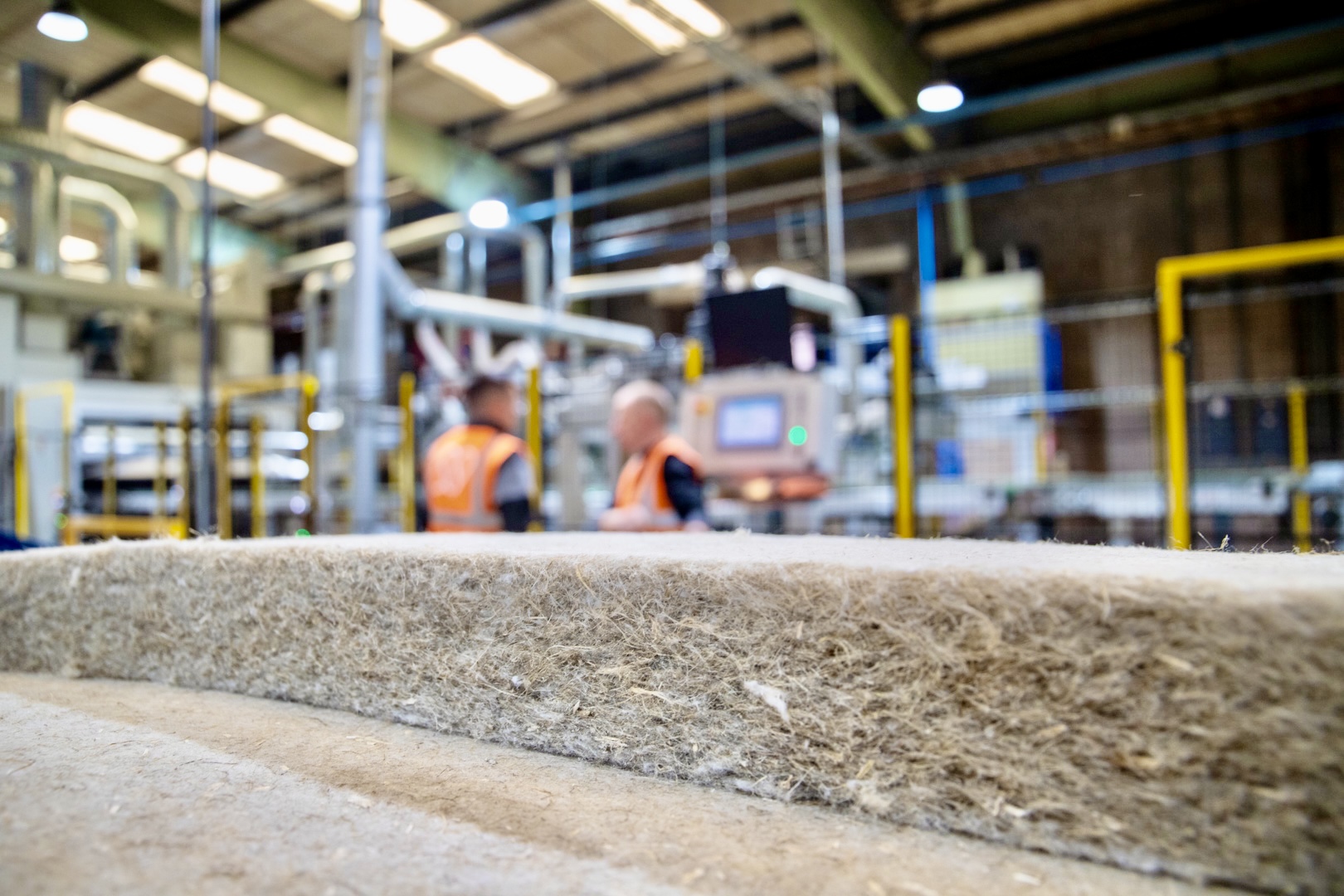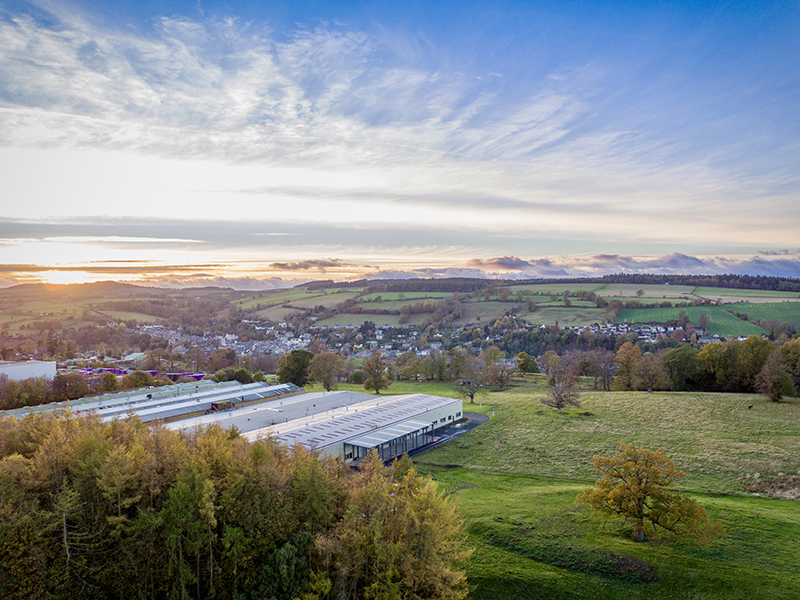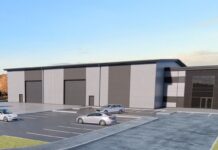
A Scottish Borders-based insulation manufacturer is on a mission to disrupt the market with a range of products made from industrial hemp plants.
IndiNature was founded eight years ago and has managed to secure funding for its carbon negative solutions from sources ranging from the Scottish National Investment Bank to Zero Waste Scotland.
The firm started manufacturing in Jedburgh three years ago and has gained increasing traction for its bio-based products, which are designed to deliver significant sustainability benefits and help create healthier and more comfortable living environments.
As the only third-party accredited hemp insulation manufacturer in the UK, the company has become a trailblazer. From a standing start, employee numbers have grown to 30, providing a welcome boost to the rural Scottish economy. So far, the main focus has been on construction products including flexible insulation batts and recently launched semi-rigid boards.

IndiNature Sales director Brian Monaghan told Project Scotland that the benefits of natural fibre insulation products stem from the carbon negative nature of the process. Unlike alternative products, there’s no requirement to mine or extract anything out of the ground or use up large amounts of energy to heat and melt the material.
“Our products come from industrial hemp plants grown in the Scottish Borders and Yorkshire,” Brian explained. “They grow from seed to eight or nine feet tall in the space of four months. During that growing season, the plants are capturing, securing and storing carbon dioxide from the atmosphere. Timber products do that too, but with them you’re looking at 15-25 years for the growing phase, whereas industrial hemp grows very quickly and sequesters a huge amount of carbon during a very short timeframe.
“There are farmers in the Scottish Borders growing industrial hemp at the moment. We are manufacturing products that are grown in Scotland and manufactured in Scotland. There are no air miles on it.”

The IndiNature product portfolio includes the first-generation pure hemp IndiTherm flexible thermal insulation batts, which can be installed in roofs, walls, and floors. The solution can be utilised in both new-build and retrofit projects and can be friction fitted between structural framing.
The product has secured BBA certification, as has IndiBreathe Flex, a second-generation product featuring a mixture of industrial hemp and recycled jute. The jute comes from coffee sacks which otherwise would likely have ended up in landfill. The fibres are incorporated into insulation batts, which helps reduce the density of the product and lower the costs without affecting its main properties with regards to thermal or fire performance.
A recent innovation is IndiBoard, a semi-rigid thermal insulation board, also made from industrial hemp. This product can be used on older buildings where it can be fitted onto a solid masonry substrate. It is coupled up with breathable plasters.
Housing associations, local authorities, and contractors are among the organisations currently using IndiNature’s solutions to help achieve environmental goals. While the products have been very well received, Brian said that the UK market is not as far along in the journey to bio-based, renewable insulation as elsewhere in Europe and America.

One of the challenges for the business is trying to encourage companies to embrace change and deviate from doing something a particular way simply because that’s the way it’s always been done.
“That’s the challenge for us as a business – to try and find the people who have the ability to influence things, make decisions, and who don’t want to do what they’ve always done and want to move things forward,” Brian added.
“There are other ways of building things now. There are various companies that have come and gone and developed modern methods of construction such as large panelised systems, but in the majority of cases, even when using timber kits to speed up the installation on site, we still revert back to building the external skins with bricks and blocks in the middle of winter.
“The industry’s quite stuck in its ways and that’s certainly some of the challenges we have as a business trying to introduce new products.”
A further challenge is the association with cannabis plants, which feels like the elephant in the room and something Brian revealed everyone inevitably asks about! Industrial hemp is not the same as the drug variety of cannabis. It contains almost negligible levels of THC (tetrahydrocannabinol), and, in fact, the advantages of industrial hemp have long been recognised. In the days of Henry VIII, every farmer in the UK was legally obliged to grow industrial hemp, as the fibres were used for ropes in the Navy.
Fast forward to present day and the projects where the IndiNature solutions have been utilised include BE-ST’s National Retrofit Centre in Blantyre and a couple of pilot schemes for a major housebuilder on an eco-village on the outskirts of Edinburgh. The Duchy of Cornwall is a big fan and has used the products in various retrofit schemes for historic buildings. Solutions have also been supplied to The Crown Estate for retrofit initiatives.
Despite being a relative newcomer, IndiNature has already scooped a number of major industry awards, including the Manufacturer of the Year accolade at the Green Business Awards 2025, the Big Retrofit Challenge at Futurebuild 2025, and the Iver Salvesen Award for Combatting Climate Change 2024 from Scottish Land & Estates.

The firm has also secured an EPD (Environmental Product Declaration) and two Life Cycle Analysis documents for its solutions. Recently it was awarded an Ofgem Innovation Uplift for its IndiBreathe Flex products when used in lofts.
“We’re the only insulation manufacturer to achieve this Uplift,” Brian added. “What that means is if we’re supplying our products into funded energy retrofit schemes, like ECO4 and GBIS, if the contractors use our product for loft applications, they’ll get additional funding. That offsets the price difference and brings it down to a comparable level.”
Next on the agenda for IndiNature will be needle punch products, using fibre from either hemp or sheep’s wool. Needle-punched nonwovens are a class of engineered fabrics produced by mechanically bonding fibres into a coherent textile, without traditional weaving or knitting. In general, nonwoven fabrics are made by first forming a loose web of fibres and then bonding or entangling those fibres to impart strength.
In needle-punched nonwovens, thousands of specially designed needles repetitively penetrate a fibre web, interlocking the fibres through friction and entanglement. The result is a felt-like fabric (often called needlefelt) that can range from thin sheets to thick, dense mats depending on the process parameters.
“The idea of that machine is to supply into other non-construction market areas, but there will be opportunities that arise for supplying into acoustic applications in construction, farming and even forestry,” Brian said. “A significant number of products used for acoustic applications at the moment are based on rubber. Consultants and contractors are trying to move away from oil-based products and into something that’s more environmentally friendly in line with their ESG commitments.”
Brian revealed that the first thing visitors to IndiNature’s Jedburgh mill notice is the smell, which he likened to cut grass. This is attributed to the use of only natural materials.
The lack of irritants also means a reduced requirement for certain forms of PPE when installing the products, leading to a more comfortable working environment, especially during the hot summer months.
Looking ahead, IndiNature has its sights set on further growth. There is more than sufficient capacity in the Jedburgh manufacturing facility for expansion if demand continues to rise.
“I’ve never worked for such a committed team,” Brian concluded. “Everybody’s pushing in the same direction. The team at the mill have really bought into the idea because they can see the substantial growth in output in such a short period of time. We’re having record sales month-on-month. It’s really great to work for a company where, when you get up in the morning, you’re going to do the right thing. You’re doing the right thing for the planet, you’re doing the right thing for the industry, and it’s such a good news story for the Scottish Borders.”








